I'm not sure if it's handy homeowners or negligent contractors that are responsible, but I find the same installation defects on water softeners over and over again. The installation instructions for water softeners are pretty much the same for all the different manufacturers, so the information I'm giving here should apply to just about any water softener.
Missing ground clamp
All of the metallic water distribution pipes in the home are supposed to be bonded; in other words, they're all supposed to be able to touch each other. If the water pipes in the home weren't bonded, what would happen if an energized (aka 'hot', aka 'ungrounded') wire came in contact with one of the pipes? All of the plumbing fixtures and other pipes that were connected would become silently energized. When everything is properly bonded and there is a proper ground jumper at the water meter, this can't happen.
I find this bonding compromised by a plastic by-pass valve at nearly half of the water softeners I see. If the water softener manufacturer provides a plastic by-pass valve, they will also provide a ground clamp that needs to be installed on the water pipes coming in to and going out of the water softener.
If you live in Saint Louis Park and you don't have this installed when it's time to sell your home, the city inspector will require repair of this as part of their Point of Sale inspection program. If you don't have the clamp, don't worry; you can achieve the same thing with a pair of ground clamps attached to the water pipes and a bare copper wire running between them.
Improper drain hose
The drain hose that comes from the water softener needs to terminate in a manner that won't create a potential cross-connection between the potable water and anything else... such as sewer water. This is usually achieved with an air gap; this is just a literal gap between the end of the discharge pipe and the drain receptor, whether it's a floor drain, standpipe, or laundry sink. The only problem with the diagram below, which is what one of the water softener manufacturers includes in their installation manual, is that water will shoot all over the place. When water softeners discharge water, the water flows fast. It doesn't dribble out.
The photo below is an example of an air gap at the floor drain. Even if the floor drain were to back up with sewer water, the water wouldn't come in contact with the end of the discharge hose. Also, note that the cover for the floor drain has been cut out a little bit; if this wasn't done, the discharge from the water softener would probably splash water all over the place.
Softened water provided to the outside faucets
While this isn't technically a defect, it's bad practice to run softened water to the outside faucets. Lawns and plants don't need softened water, and this is a tremendous waste of softened water. Any time a water softener is installed, the water supply pipes for the outside faucets should be connected upstream of the water softener.
It's also standard practice to connect the cold water for the kitchen sink upstream of the water softener. The reason for this is that softened water will have a higher sodium content - but probably not enough to make much of a difference, according to the Mayo Clinic web site.
In the photo below, you can see that all the water for the house passes through the water softener; this is a wasteful installation that should be corrected. Because this was an unfinished room, it would be quite simple to run un-softened water to the outside faucets and kitchen sink.
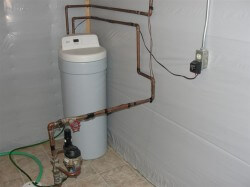
Powered by an extension cord
This is probably the biggest "no duh" defect that I find with water softeners. Everyone knows that extension cords aren't supposed to be used as a substitute for permanent wiring. If an outlet is needed, it should be installed by an electrician.
That concludes my list of the most common water softener installation defects. While I'm on the topic of water softeners though, here's one more piece of information; this list gives the water hardness for most cities in the Twin Cities metro area. I keep this list with me, and use it as a reference whenever a clients asks me about the water hardness is their city. Water Hardness List
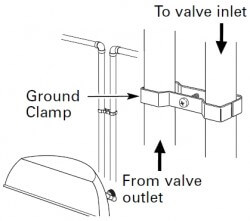
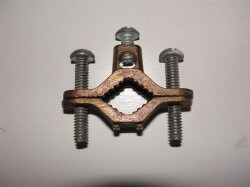
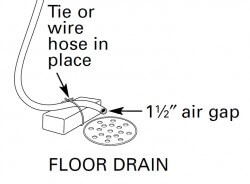
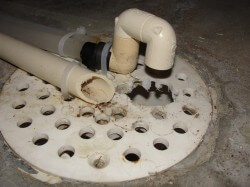

Comments(12)